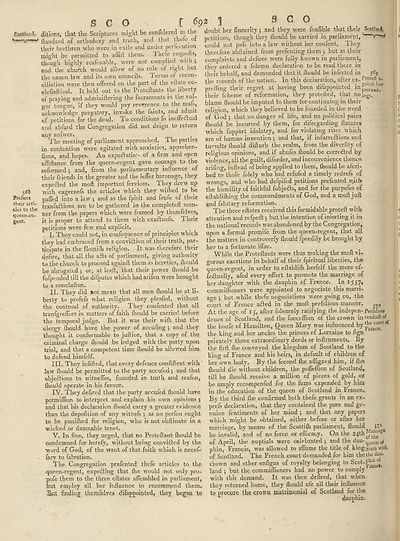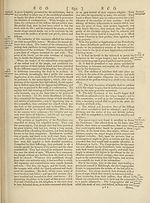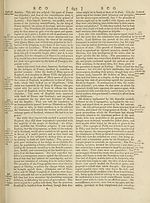Encyclopaedia Britannica, or, a Dictionary of arts, sciences, and miscellaneous literature : enlarged and improved. Illustrated with nearly six hundred engravings > Volume 18, RHI-SCR
(730) Page 692
Download files
Complete book:
Individual page:
Thumbnail gallery: Grid view | List view

$69
Frcfent
their arti¬
cles to the
queen-re¬
gent.
SCO [69
gcrttlaml. ditiom, that the Scriptures might be confitlered as the
‘’♦“‘'V"—' ftandard of orthodoxy and truth, and that thofe^ of
their brethren who were in exile and under perfecution
might be permitted to affiit them. 1 befe requefts,
though highly reafonable, were not complied with j
and the church would allow of no rule ot right but
the canon law and its own councils. Terms of recon¬
ciliation were then offered on the part of the ell ate ec-
(flefiaftical. It held out to the Proteftants the liberty
of praying and adminiftering the facraments in the vul¬
gar tongue, if they would pay reverence to the mafs,
acknowledge purgatory, invoke the faints, and admit
of petitions for the dead. To conditions fo inetfe&ual
and abfurd the Congregation did not deign to return
any anfwer.
The meeting of parliament approached. The parties
in contention were agitated with anxieties, apprehen-
fions, and hopes. An expeftatio:*- of a firm and open
affiftance from the queen-regent gave courage to the
reformed •, and, from the parliamentary influence of
their friends in the greater and the leffer baronage, they
expedled the moft important fervices. They drew up
with eagernefs the articles which they wilhed to be
paffed into a law *, and as the fpirit and fenfe of their
tranfa&ions are to be gathered in the completed; man¬
ner from the papers which were framed by themfelves,
it is proper to attend to them with exa&nefs. Their
petitions were few and explicit.
I. They could not, in confequence of principles which
they had embraced from a convi&ion of their truth, par¬
ticipate in the Rotnifh religion. It was therefore their
defire, that all the aSs of parliament, giving authority
to the church to proceed againft them as heretics, fhould
be abrogated j or, at lead, that their power fhould be
fufpended till the difputes which had arifen were brought
to a conclufion.
II. They did »ot mean that all men fhould be at li¬
berty to profefs what religion they pleafed, without
the controul of authority. They confented that all
tranfigreflors in matters of faith diould be carried before
the temporal judge. But it was their wifh that the
clergy fhould have the power of accufing 5 and they
thought it conformable to judice, that a copy of the
criminal charge fhould be lodged with the party upon
trial, and that a competent time diould be allowed him
to defend himfelf.
III. They infilled, that every defence confident with
law diould be permitted to the party accufed; and that
obje&ions to witnefTes, founded in truth and reafon,
fhould operate in his favour.
IV. They defired that the party accufed fliould have
permiflion to interpret and explain his own opinions 3
and that his declaration fhould carry a greater evidence
than the depofition of any witnefs ; as no perfon ought
to be punifhed for religion, who is not obflinate in a
wicked or damnable tenet.
V. In fine, they urged, that no Proteflant fhould be
condemned for herefy, without being convidled by the
word of God, of the want of that faith which is necef-
fary to falvation.
The Congregation prefented thefe articles to the
queen-regent, expecting that die would not only pro-
pofe them to the three eftates affembled in parliament,
but employ all her influence to recommend them.
But finding themfelves difappointed, they began to
23 SCO
doubt her fincerity 3 and they were fenfible that their Scotlanl,
petitions, though they fliould be carried in parliament, * ^
could not pafs into a law without her confent. They
therefore abftained from prefenting them 3 but as their
complaints and defires were fully known in parliament,
they ordered a folenm declaration to be read there in
their behalf, and demanded that it fliould be inferted in 569
the records of the nation. In this declaration, after ex-
prefling their regret at having been difappointed in^esd*c
their fcheme of reformation, they protefled, that noing?.
blame fhould be imputed to them for continuing in their
religion, which they believed to be founded in the word
of God 3 that no danger of life, and no political pains
fliould be incurred by them, for difregarding ftatutes
which fupport idolatry, and for violating rites which
are of human invention 3 and that, if infurre&ions and
tumults fliould difturb the realm, from the diverfity of
religious opinions, and if abufes ftiould be corrected by
violence, all the guilt, diforder, and inconvenience thence
arifing, inftead of being applied to them, ftiould be aferi-
bed to thofe folely who had refufed a timely redrefs of
wrongs, and who had defpifed petitions prefented wjitb
the humility of faithful fubje&s, and for the purpofes of
eftablifhing the commandments of God, and a moft: juft
and falutary reformation.
The three eftates received this formidable proteft with
attention and refpeft 3 but the intention of inferting it in
the national records was abandoned by the Congregation,
upon a formal promife from the queen-regent, that all
the matters in controverfy ftiould fpeedily be brought by
her to a fortunate iflfue.
While the Proteftants were thus making the moft vi¬
gorous exertions in behalf of their fpiritual liberties, the
queen-regent, in order to eftablifti herfelf the more ef-
fe&ually, ufed every effort to promote the marriage of
her daughter with the dauphin of France. In 1557,
commiffioners were appointed to negociate this marri¬
age 3 but while thefe negociations were going on, the
court of France added in the moft perfidious manner.
At the age of 15, after folemnly ratifying the indepen-Perfidioiti_
deuce of Scotland, and the fucceflion of the crown in ccmdua of
the houfe of Hamilton, Queen Mary was influenced byj1^0"11
the king and her uncles the princes of Lorraine to fign
privately three extraordinary deeds or inftruments. By
the firft ftie conveyed the kingdom of Scotland to the
king of France and his heirs, in default of children of
her own body. By the fecond flie afligned him, if fine
ftiould die without children, the poffeflion of Scotland,
till he ftiould receive a million of pieces of gold, or
be amply recompenfed for the fums expended by him
in the education of the queen of Scotland in France.
By the third ftie confirmed both thefe grants in an ex-
prefs declaration, that they contained the pure and ge¬
nuine fentiments of her mind 3 and that any papers
which might be obtained, either before or after her
marriage, by means of the Scottifti parliament, fliould S7r
be invalid, and of no force or efficacy. On the 24th
of April, the nuptials were celebrated 3 and the dau- queeB of
phin, Francis, was allowed to affume the title of king scots with
of Scotland. The French court demanded for him the the dau-
crown and other enfigms of royalty belonging to Scot-
land 3 but the commiffioners had no power to comply
with this demand. It was then defired, that when
they returned home, they ftiould ufe all their influence
to procure the crown matrimonial of Scotland for ffie
dauphin*
Frcfent
their arti¬
cles to the
queen-re¬
gent.
SCO [69
gcrttlaml. ditiom, that the Scriptures might be confitlered as the
‘’♦“‘'V"—' ftandard of orthodoxy and truth, and that thofe^ of
their brethren who were in exile and under perfecution
might be permitted to affiit them. 1 befe requefts,
though highly reafonable, were not complied with j
and the church would allow of no rule ot right but
the canon law and its own councils. Terms of recon¬
ciliation were then offered on the part of the ell ate ec-
(flefiaftical. It held out to the Proteftants the liberty
of praying and adminiftering the facraments in the vul¬
gar tongue, if they would pay reverence to the mafs,
acknowledge purgatory, invoke the faints, and admit
of petitions for the dead. To conditions fo inetfe&ual
and abfurd the Congregation did not deign to return
any anfwer.
The meeting of parliament approached. The parties
in contention were agitated with anxieties, apprehen-
fions, and hopes. An expeftatio:*- of a firm and open
affiftance from the queen-regent gave courage to the
reformed •, and, from the parliamentary influence of
their friends in the greater and the leffer baronage, they
expedled the moft important fervices. They drew up
with eagernefs the articles which they wilhed to be
paffed into a law *, and as the fpirit and fenfe of their
tranfa&ions are to be gathered in the completed; man¬
ner from the papers which were framed by themfelves,
it is proper to attend to them with exa&nefs. Their
petitions were few and explicit.
I. They could not, in confequence of principles which
they had embraced from a convi&ion of their truth, par¬
ticipate in the Rotnifh religion. It was therefore their
defire, that all the aSs of parliament, giving authority
to the church to proceed againft them as heretics, fhould
be abrogated j or, at lead, that their power fhould be
fufpended till the difputes which had arifen were brought
to a conclufion.
II. They did »ot mean that all men fhould be at li¬
berty to profefs what religion they pleafed, without
the controul of authority. They confented that all
tranfigreflors in matters of faith diould be carried before
the temporal judge. But it was their wifh that the
clergy fhould have the power of accufing 5 and they
thought it conformable to judice, that a copy of the
criminal charge fhould be lodged with the party upon
trial, and that a competent time diould be allowed him
to defend himfelf.
III. They infilled, that every defence confident with
law diould be permitted to the party accufed; and that
obje&ions to witnefTes, founded in truth and reafon,
fhould operate in his favour.
IV. They defired that the party accufed fliould have
permiflion to interpret and explain his own opinions 3
and that his declaration fhould carry a greater evidence
than the depofition of any witnefs ; as no perfon ought
to be punifhed for religion, who is not obflinate in a
wicked or damnable tenet.
V. In fine, they urged, that no Proteflant fhould be
condemned for herefy, without being convidled by the
word of God, of the want of that faith which is necef-
fary to falvation.
The Congregation prefented thefe articles to the
queen-regent, expecting that die would not only pro-
pofe them to the three eftates affembled in parliament,
but employ all her influence to recommend them.
But finding themfelves difappointed, they began to
23 SCO
doubt her fincerity 3 and they were fenfible that their Scotlanl,
petitions, though they fliould be carried in parliament, * ^
could not pafs into a law without her confent. They
therefore abftained from prefenting them 3 but as their
complaints and defires were fully known in parliament,
they ordered a folenm declaration to be read there in
their behalf, and demanded that it fliould be inferted in 569
the records of the nation. In this declaration, after ex-
prefling their regret at having been difappointed in^esd*c
their fcheme of reformation, they protefled, that noing?.
blame fhould be imputed to them for continuing in their
religion, which they believed to be founded in the word
of God 3 that no danger of life, and no political pains
fliould be incurred by them, for difregarding ftatutes
which fupport idolatry, and for violating rites which
are of human invention 3 and that, if infurre&ions and
tumults fliould difturb the realm, from the diverfity of
religious opinions, and if abufes ftiould be corrected by
violence, all the guilt, diforder, and inconvenience thence
arifing, inftead of being applied to them, ftiould be aferi-
bed to thofe folely who had refufed a timely redrefs of
wrongs, and who had defpifed petitions prefented wjitb
the humility of faithful fubje&s, and for the purpofes of
eftablifhing the commandments of God, and a moft: juft
and falutary reformation.
The three eftates received this formidable proteft with
attention and refpeft 3 but the intention of inferting it in
the national records was abandoned by the Congregation,
upon a formal promife from the queen-regent, that all
the matters in controverfy ftiould fpeedily be brought by
her to a fortunate iflfue.
While the Proteftants were thus making the moft vi¬
gorous exertions in behalf of their fpiritual liberties, the
queen-regent, in order to eftablifti herfelf the more ef-
fe&ually, ufed every effort to promote the marriage of
her daughter with the dauphin of France. In 1557,
commiffioners were appointed to negociate this marri¬
age 3 but while thefe negociations were going on, the
court of France added in the moft perfidious manner.
At the age of 15, after folemnly ratifying the indepen-Perfidioiti_
deuce of Scotland, and the fucceflion of the crown in ccmdua of
the houfe of Hamilton, Queen Mary was influenced byj1^0"11
the king and her uncles the princes of Lorraine to fign
privately three extraordinary deeds or inftruments. By
the firft ftie conveyed the kingdom of Scotland to the
king of France and his heirs, in default of children of
her own body. By the fecond flie afligned him, if fine
ftiould die without children, the poffeflion of Scotland,
till he ftiould receive a million of pieces of gold, or
be amply recompenfed for the fums expended by him
in the education of the queen of Scotland in France.
By the third ftie confirmed both thefe grants in an ex-
prefs declaration, that they contained the pure and ge¬
nuine fentiments of her mind 3 and that any papers
which might be obtained, either before or after her
marriage, by means of the Scottifti parliament, fliould S7r
be invalid, and of no force or efficacy. On the 24th
of April, the nuptials were celebrated 3 and the dau- queeB of
phin, Francis, was allowed to affume the title of king scots with
of Scotland. The French court demanded for him the the dau-
crown and other enfigms of royalty belonging to Scot-
land 3 but the commiffioners had no power to comply
with this demand. It was then defired, that when
they returned home, they ftiould ufe all their influence
to procure the crown matrimonial of Scotland for ffie
dauphin*
Set display mode to:
![]() Universal Viewer |
Universal Viewer | ![]() Mirador |
Large image | Transcription
Mirador |
Large image | Transcription
Images and transcriptions on this page, including medium image downloads, may be used under the Creative Commons Attribution 4.0 International Licence unless otherwise stated. ![]()
| Permanent URL | https://digital.nls.uk/193028197 |
|---|
| Attribution and copyright: |
|
|---|
| Description | Ten editions of 'Encyclopaedia Britannica', issued from 1768-1903, in 231 volumes. Originally issued in 100 weekly parts (3 volumes) between 1768 and 1771 by publishers: Colin Macfarquhar and Andrew Bell (Edinburgh); editor: William Smellie: engraver: Andrew Bell. Expanded editions in the 19th century featured more volumes and contributions from leading experts in their fields. Managed and published in Edinburgh up to the 9th edition (25 volumes, from 1875-1889); the 10th edition (1902-1903) re-issued the 9th edition, with 11 supplementary volumes. |
|---|---|
| Additional NLS resources: |
|

